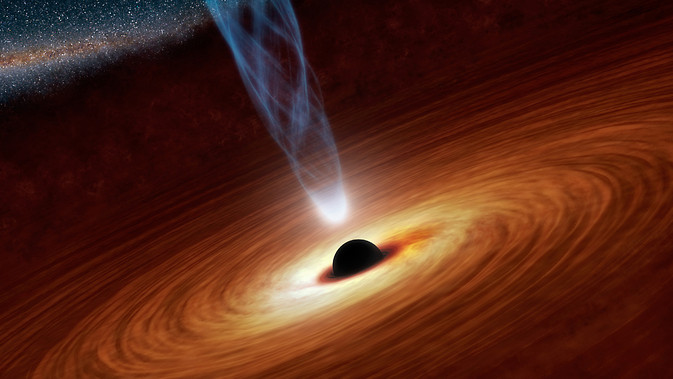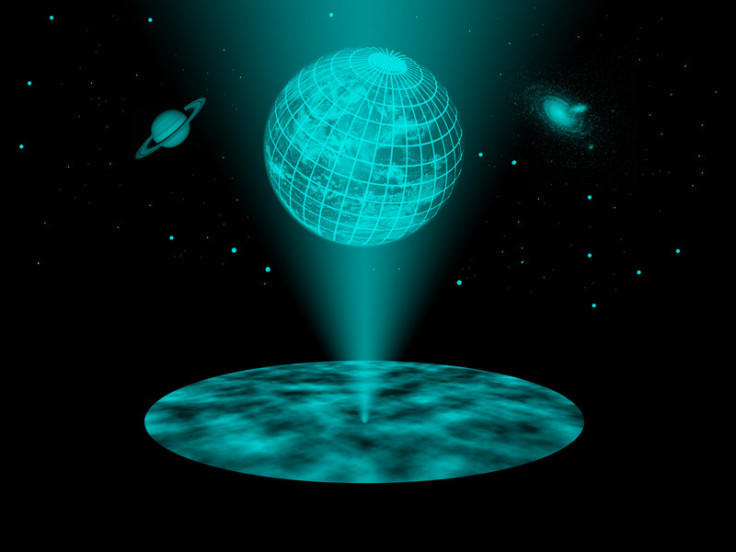If Earth hit the surface of a black hole 'it would become a hologram copy and continue to exist'

If Earth was sucked into a black hole, we would not even notice as it would become a hologram copy and continue to exist, a theoretical physicist has said.
Samir Mathur, from the Ohio State University in Columbus, was discussing his "fuzzball" theory of black holes, which uses the principles of string theory to show they are tangled balls of cosmic strings.
Another idea recently proposed was that black holes have "firewalls" on their surface that destroy everything they touch. In this theory, which builds upon Mathur's fuzzball ideas, researchers said the surface of the black hole is deadly – the firewall name came from the fiery death awaiting anything that touches it.
However, Mathur and his colleagues have reached a different conclusion about his fuzzball theory – that material which touches the surface of a black hole would become an almost exact copy of itself and would continue to exist as before.
In his paper Fuzzballs, Firewalls And All That..., the physicist says the main discrepancy comes from the physics hypothesis of complementarity. This idea requires any hologram created by a black hole to be a perfect copy – and experts all agree this is not possible.
Opponents say that without perfect complementarity, all that can be is death. Mathur instead says the hologram could be "near-perfect". He developed a modified model of complementarity that assumes imperfect hologram forms and says it is proven mathematically.
In the paper, he wrote: "Even though the infalling object must stop at the fuzzball surface, the dynamics of the impact could mimic infall through a horizon.
"To see what this means, consider a simple example. In one room, we place a piano; and in a second room, we place an electronic keyboard. The piano produces sounds through vibrations of strings; the different notes correspond to different frequencies of vibration of the strings. The electronic keyboard produces its frequencies by oscillations of electric currents in electronic circuits, a very different mechanism!
"But the set of allowed frequencies is approximately the same in the two cases, so it is hard to tell if the instrument playing in a room is a piano or an electronic keyboard. We say that the keyboard 'effectively mimics' the piano, though it is a completely different physical object."
Imperfection

Mathur's theory centres on the idea of imperfection and whether or not we can accept that black holes, like the rest of the universe, are not perfect. The other side of the debate rejects the idea of imperfection, which is why they reached different conclusions.
He explained: "It's not that kind of disagreement. It's a simple question, really. Do you accept the idea of imperfection, or do you not?"
Stephen Hawking said the universe was imperfect from the moment it existed – without it, gravity would not have been able to draw together the atoms that make up everything in it.
This refers to the "information paradox", a debate that says material that falls into a black hole becomes part of the black hole, rather than being destroyed. The black hole is then permanently changed, meaning every black hole is unique – a product of the material it engulfs.
Fuzzball theory helped to resolve the information paradox because it suggests material does not fall into black holes but on to them. "There's no such thing as a perfect black hole, because every black hole is different," Mathur said.
String theory says our 3D existence could actually be a hologram on a surface that exists in many more dimensions. Firewall theory, Mathur says, would directly contradict this. He said: "If the surface of a black hole is a firewall, then the idea of the universe as a hologram has to be wrong."
© Copyright IBTimes 2025. All rights reserved.





















